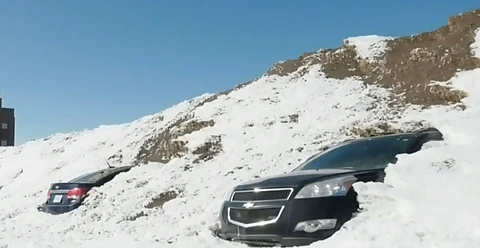

Only in Canada?
In what it is calling “a bold move” to combat climate change, the City of Ottawa has introduced a strict by-law limiting residents from using remote car starters to warm up their vehicles for more than one minute before driving.
The law, intended to reduce greenhouse gas emissions and improve local air quality, has sparked heated debate, especially given Ottawa’s notoriously harsh winters.
The new rule allows vehicles to idle for just 60 seconds if the driver is not inside. For residents braving the cold inside their cars, idling is permitted for up to 10 minutes if temperatures are below freezing.
Those caught letting their vehicle run unattended beyond the one-minute limit, even on private property, risk being fined by by-law officers.
The policy is part of Ottawa’s ongoing ‘climate action plan,’ with city officials citing the need to cut emissions as a key reason for the crackdown. On its website, the city states: “We are lowering greenhouse gas emissions and improving Ottawa’s air quality.”
But critics argue that the new law disregards the practical realities of living in one of the coldest capitals in the world with average temperatures dipping as low as -14°C in January.
Opponents fear the new restriction could force them to endure dangerously cold conditions during the winter months.
“It’s ridiculous,” said local resident Jason Miller. “It can take 20 minutes to defrost my windshield some mornings. Are we supposed to just sit there and freeze while waiting?”
Supporters of the new rules argue that cutting idling times will help curb unnecessary pollution and promote more sustainable living practices.
“Every little bit counts,” said city councillor Laura Green. “We know it’s cold, but we also know that climate change is a real and urgent problem. This is about protecting our future.”
But skeptics question the effectiveness — and efficacy — of the policy. Canada contributes just 1.6% of global carbon emissions, and detractors argue efforts to reduce idling won’t make a significant impact globally, especially as major polluters like China continue to build coal-fired power plants at an alarming rate.
“There’s a point where climate policies stop being about the environment and start being about control,” said climate policy critic David Blake. “When by-law officers can walk onto your property to issue fines for warming up your car, we have to ask if this is really about saving the planet or just making life harder for Canadians.”
The new by-law comes at a time when the broader debate around climate change continues to evolve, and recent studies increasingly cast doubt on long-standing claims of global warming.
New research from multiple sources, including the University of Colorado, has shown that the Antarctic ice sheet is the largest it has been in 21 years, contrary to warnings about melting polar ice. Similarly, data from Greenland indicates cooling temperatures over the past 20 years, challenging predictions of catastrophic ice loss.
Some researchers have even questioned the role of carbon dioxide as a greenhouse gas, with several independent studies from the likes of NASA and Columbia University suggest that the role of CO2 on global temperature is misunderstood or even neglibile.
But for now, many Ottawans are bracing for a chilly reception to the new rule as winter sets in. While city officials remain firm in their commitment to fighting climate change, residents like Miller say they feel left out in the cold — quite literally.
“It’s one thing to care about the environment,” he said, “but it’s another thing to freeze to death trying to do it.”
